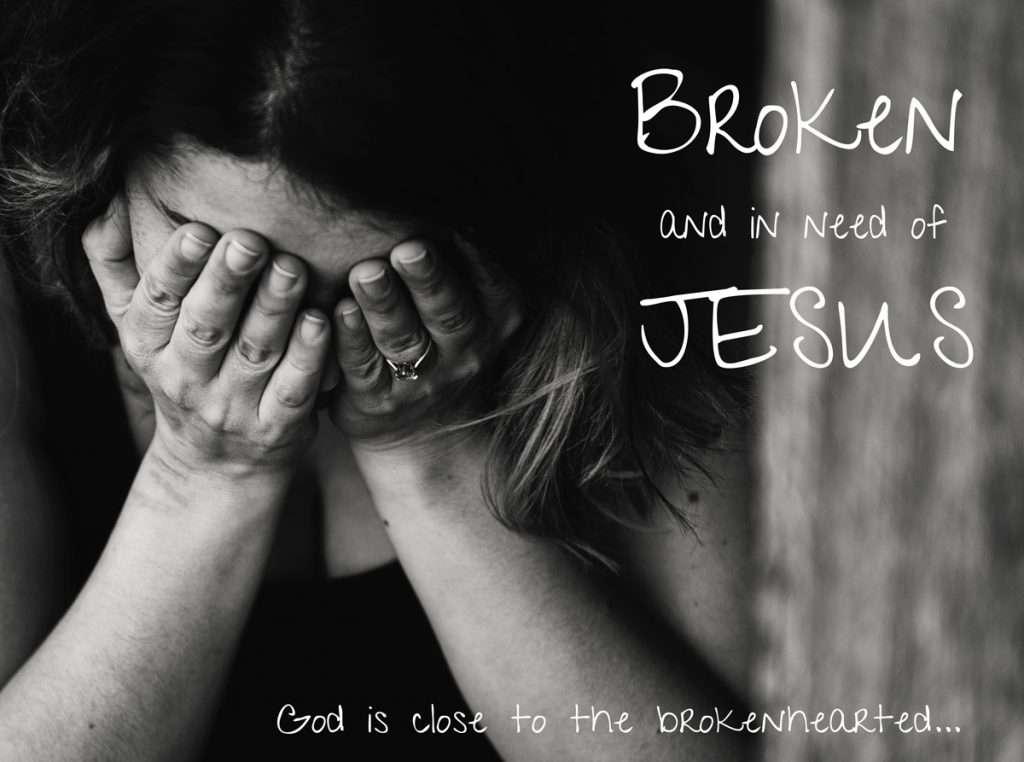
Broken, shattered, cracked, crippled, and damaged. Not pretty words.
Broken is a disturbing word that creates anxiety. Broken families bring pain to both adults and children. Broken churches cause fighting between brothers and sisters in Christ. Breaking a family heirloom or causing a mess when dropping a dish, brings back anxious moments from our childhood. And what about the time you fell from the tree you weren’t supposed to climb in the first place? Eight weeks in a cast wasn’t fun.

Eight women gather in my home for a Bible study, and during this session, we are delving into a Jennie Allen study which focuses on a different word in each chapter. Taking a different viewpoint from the study, during the next few weeks we will look at the spiritual implications of these various words through the eyes of biblical women. We begin with the word broken.
GOD IS CLOSE TO THE BROKENHEARTED.
“The LORD is near to those who have a broken heart, and saves such as have a contrite spirit” Psalm 34:18 NKJV).
Reading this Psalm gives us insight into God’s goodness. He is near when we are broken.

JESUS MEETS US IN OUR BROKEN STATE

The woman we study this week is not named. We only know her as the ‘Woman at the Well.’ Our Verse of the Week comes from this woman’s interaction with Jesus. He speaks compassionately to this broken woman:
Jesus answered and said to her, “If you knew the gift of God, and who it is who says to you, ‘Give Me a drink,’ you would have asked Him, and He would have given you living water”( John 4:10 NKJV).
The destination is Galilee and Jesus took the shortcut. Jews generally didn’t go through Samaria because, to say the least, there was animosity between the Jews and Samaritans. After all, Samaritans were not pure Jews.
Ironically, both Jesus and the venerated King David’s heritage include a Gentile woman of ill repute named Rahab and a Gentile from the hated Moabite people whose name was Ruth. Suffice it to say, Jesus was less interested in ethnic purity and more concerned about people’s hearts.
Despite the cultural prejudice, Jesus wasn’t missing a divinely appointed meeting. He was tired from the long walk and He sat by the well built by the patriarch Jacob. Surely Jesus knew why He was at this particular well at this specific time. He waited for a woman to arrive – not just any woman, but the shamed woman of Samaria.
Hmm, Jesus waiting patiently. Perhaps a sermon, Scripture verse, or conversation strikes a chord and you know God wants to talk; however, you stay away hoping He forgets. Rest assured, he doesn’t forget about you, and when He has a divine appointment, He isn’t going to miss it – even if you do.
While we go about our lives, Jesus waits for us to come. He waits not just for any woman – no, he waits for you.
DO WE HIDE OUR BROKEN STATE FROM JESUS AND OTHERS?

Ordinarily, people didn’t draw water from the well at this time of the day; however, Jesus knew she would show up. You see, this woman was ‘persona non grata’ in Samaria, and she chose her visits to the well strategically to avoid the looks, snide remarks, and gossip of her neighbors. In other words, she hid her brokenness from others.
She did arrive and Jesus asked her for water. Startled that this Jewish man was speaking to a woman in public, especially a Samaritan woman of her moral standing, she was immediately suspicious; nevertheless, Jesus’ invites her to partake of the ultimate gift – living water.
Never being thirsty again was an offer too valuable for this woman not to explore. Fetching water was hard work, notwithstanding the risk of running into judgmental neighbors.

Jesus offers His gift to the woman in her sinful state, but immediately thereafter deals with her sin and promiscuous lifestyle by asking about her husband. She answers His question but, at the same time, tries to hide her brokenness from Jesus. She says she has no husband. So, Jesus expands on her truthful, albeit incomplete, answer.
“for you have had five husbands, and the one whom you now have is not your husband; in that you spoke truly” (John 4:18 NKJV).
DO WE CHALLENGE GOD’S SOVEREIGNTY IN OUR BROKEN LIVES?
Caught in her sin, she changes the subject and challenges Jesus with a doctrinal question:
Our fathers worshiped on this mountain, and you Jews say that in Jerusalem is the place where one ought to worship” (John 4:20 NKJV).
The usual arguments are not Jesus’ style. Instead, he tells her that where we worship is not as important as how we worship.
“But the hour is coming, and now is, when the true worshipers will worship the Father in spirit and truth; for the Father is seeking such to worship Him” (John 4:23 NKJV).
Fascinated, she wants to learn more.
DO WE ALLOW OTHERS OPINIONS TO KEEP US FROM JESUS?
However, distracted by the disapproving disciples who are approaching the well, she looks for a way out. What did they say to her? Nothing, instead they let their demeanor chastise her, and consequently, she reverts to her usual modus operandi and runs away. Is this your reaction to disapproval?

A side note, notice the cowardly disciples didn’t address their concern with Jesus!
CAN YOU ADMIT YOUR BROKEN STATE?
Where am I broken? Insecurity, worry, and doubt plague my life. I know Jesus wants a divine appointment to help me. Why do I equivocate?

For the same reasons, the woman at the well avoided Jesus’ direct questions and allowed other people to scare her off.
GOD CAN AND WILL USE US – EVEN IN OUR BROKEN STATE
Despite her fear, she can’t forget this man’s words and wisdom. In contrast to her usual behavior, she seeks others out to tell them about this amazing man.
“and many of the Samaritans of that city believed in Him because of the word of the woman who testified, “He told me all that I ever did” John 4:39 (NKJV).
This broken woman was used by Jesus to bring many to the truth.
LESSONS TO LEARN FROM THE WOMAN AT THE WELL
- Like the “Woman at the Well” we are all broken and in need of Jesus
- Allow God to break through and repair the damage of our brokenness so we may be free from guilt, shame, and fear.
- Respond to God’s invitation and outreach.
- When he deals with our sin, don’t change the subject.
- Tell everyone you know, how God has touched your life.
- Jesus can and will use us even in our brokenness.
As we close this post, look at Psalm 34 again. It seems this unnamed woman at the well responded to Jesus as David outlines in this Psalm. Praise God, Pray to God, Fear God, Listen to God, Serve God, and take Refuge in God.
These lessons learned are not one and done. Allowing God to heal our brokenness is a lifetime pursuit.
MORE INFORMATION
You can read the entire passage in John 4: 1—42.
If you want to read about the two women ancestors of Jesus you will find the fast-paced and exciting story of Rahab in the Book of Joshua chapter 2 and chapter 6: 1—5 & 15—21. Read Ruth’s romantic saga in the Book of Ruth, the story is only four chapters long.
Too Flawed for Jesus. is a previous post that addresses this subject from a different perspective.
COMMENTS
Any thoughts on this article? Please comment below. Every woman reading this post is broken in some way, and sharing our weaknesses provide freedom and comfort to others.
If you don’t receive my email notices, click on the heart on the right side of this page and subscribe. I never share or sell emails and your inbox won’t be inundated from WSC.
Next week we look at the word MAD.
Blessings until next time.

Love this story. This whole idea of living water is such a beautiful picture of our relationship with Jesus, we constantly need Him to survive. I’m also struck by how quickly and effectively she is used in bringing others to Christ directly after her encounter with Him! Great blog, thanks Patrice!
Thanks for sharing, Cassandra.